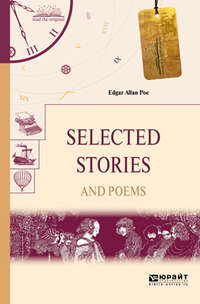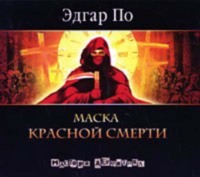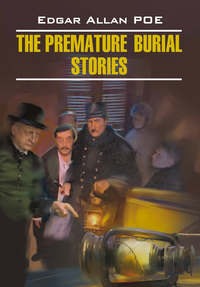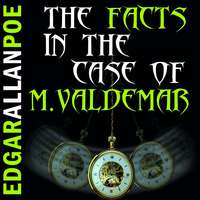 полная версия
полная версияThe Complete Stories of Edgar Allan Poe
“I see you know me, Bon-Bon,” said he: “ha! ha! ha! – he! he! he! – hi! hi! hi! – ho! ho! ho! – hu! hu! hu!” – and the devil, dropping at once the sanctity of his demeanor, opened to its fullest extent a mouth from ear to ear, so as to display a set of jagged and fang-like teeth, and throwing back his head, laughed long, loudly, wickedly, and uproariously, while the black dog, crouching down upon his haunches, joined lustily in the chorus, and the tabby cat, flying off at a tangent, stood up on end, and shrieked in the farthest corner of the apartment.
Not so the philosopher: he was too much a man of the world either to laugh like the dog, or by shrieks to betray the indecorous trepidation of the cat. It must be confessed, he felt a little astonishment to see the white letters which formed the words “Rituel Catholique ” on the book in his guest’s pocket, momently changing both their color and their import, and in a few seconds, in place of the original title, the words “Régitre des Condamnés ” blazed forth in characters of red. This startling circumstance, when Bon-Bon replied to his visiter’s remark, imparted to his manner an air of embarrassment which probably might not otherwise have been observed.
“Why, sir,” said the philosopher, “why, sir, to speak sincerely – I believe you are – upon my word – the d – dest – that is to say, I think – I imagine – I have some faint – some very faint idea – of the remarkable honor —”
“Oh! – ah! – yes! – very well!” interrupted his Majesty; “say no more – I see how it is.” And hereupon, taking off his green spectacles, he wiped the glasses carefully with the sleeve of his coat, and deposited them in his pocket.
If Bon-Bon had been astonished at the incident of the book, his amazement was now much increased by the spectacle which here presented itself to view. In raising his eyes, with a strong feeling of curiosity to ascertain the color of his guest’s, he found them by no means black, as he had anticipated – nor gray, as might have been imagined – nor yet hazel nor blue – nor indeed yellow nor red – nor purple – nor white – nor green – nor any other color in the heavens above, or in the earth beneath, or in the waters under the earth. In short, Pierre Bon-Bon not only saw plainly that his Majesty had no eyes whatsoever, but could discover no indications of their having existed at any previous period – for the space where eyes should naturally have been, was, I am constrained to say, simply a dead level of flesh.
It was not in the nature of the metaphysician to forbear making some inquiry into the sources of so strange a phenomenon; and the reply of his Majesty was at once prompt, dignified, and satisfactory.
“Eyes! my dear Bon-Bon – eyes! did you say? – oh! – ah! – I perceive! The ridiculous prints, eh, which are in circulation, have given you a false idea of my personal appearance? Eyes! – true. Eyes, Pierre Bon-Bon, are very well in their proper place – that, you would say, is the head? – right – the head of a worm. To you likewise these optics are indispensable – yet I will convince you that my vision is more penetrating than your own. There is a cat I see in the corner – a pretty cat – look at her – observe her well. Now, Bon-Bon, do you behold the thoughts – the thoughts, I say, – the ideas – the reflections – which are being engendered in her pericranium? There it is, now – you do not! She is thinking we admire the length of her tail and the profundity of her mind. She has just concluded that I am the most distinguished of ecclesiastics, and that you are the most superficial of metaphysicians. Thus you see I am not altogether blind; but to one of my profession, the eyes you speak of would be merely an incumbrance, liable at any time to be put out by a toasting-iron or a pitchfork. To you, I allow, these optical affairs are indispensable. Endeavor, Bon-Bon, to use them well; – my vision is the soul.”
Hereupon the guest helped himself to the wine upon the table, and pouring out a bumper for Bon-Bon, requested him to drink it without scruple, and make himself perfectly at home.
“A clever book that of yours, Pierre,” resumed his Majesty, tapping our friend knowingly upon the shoulder, as the latter put down his glass after a thorough compliance with his visiter’s injunction. “A clever book that of yours, upon my honor. It’s a work after my own heart. Your arrangement of the matter, I think, however, might be improved, and many of your notions remind me of Aristotle. That philosopher was one of my most intimate acquaintances. I liked him as much for his terrible ill temper, as for his happy knack at making a blunder. There is only one solid truth in all that he has written, and for that I gave him the hint out of pure compassion for his absurdity. I suppose, Pierre Bon-Bon, you very well know to what divine moral truth I am alluding?”
“Cannot say that I —”
“Indeed! – why it was I who told Aristotle, that, by sneezing, men expelled superfluous ideas through the proboscis.”
“Which is – hiccup! – undoubtedly the case,” said the metaphysician, while he poured out for himself another bumper of Mousseux, and offered his snuff-box to the fingers of his visiter.
“There was Plato, too,” continued his Majesty, modestly declining the snuff-box and the compliment it implied – “there was Plato, too, for whom I, at one time, felt all the affection of a friend. You knew Plato, Bon-Bon? – ah, no, I beg a thousand pardons. He met me at Athens, one day, in the Parthenon, and told me he was distressed for an idea. I bade him write down that o nous estin aulos (Greek – Ed.). He said that he would do so, and went home, while I stepped over to the pyramids. But my conscience smote me for having uttered a truth, even to aid a friend, and hastening back to Athens, I arrived behind the philosopher’s chair as he was inditing the ‘aulos.’ Giving the lambda a fillip with my finger, I turned it upside down. So the sentence now reads ‘o nous estin augos‘, and is, you perceive, the fundamental doctrine in his metaphysics.”
“Were you ever at Rome?” asked the restaurateur, as he finished his second bottle of Mousseux, and drew from the closet a larger supply of Chambertin.
But once, Monsieur Bon-Bon, but once. There was a time,” said the devil, as if reciting some passage from a book – “there was a time when occurred an anarchy of five years, during which the republic, bereft of all its officers, had no magistracy besides the tribunes of the people, and these were not legally vested with any degree of executive power – at that time, Monsieur Bon-Bon – at that time only I was in Rome, and I have no earthly acquaintance, consequently, with any of its philosophy.”
“What do you think of – what do you think of – hiccup! – Epicurus?”
“What do I think of whom? ” said the devil, in astonishment; “you cannot surely mean to find any fault with Epicurus! What do I think of Epicurus! Do you mean me, sir? – I am Epicurus! I am the same philosopher who wrote each of the three hundred treatises commemorated by Diogenes Laertes.”
“That’s a lie!” said the metaphysician, for the wine had gotten a little into his head.
“Very well! – very well, sir! – very well, indeed, sir!” said his Majesty, apparently much flattered.
“That’s a lie!” repeated the restaurateur, dogmatically, “that’s a – hiccup! – a lie!”
“Well, well, have it your own way!” said the devil, pacifically; and Bon-Bon, having beaten his Majesty at argument, thought it his duty to conclude a second bottle of Chambertin.
“As I was saying,” resumed the visiter, “as I was observing a little while ago, there are some very outre notions in that book of yours, Monsieur Bon-Bon. What, for instance, do you mean by all that humbug about the soul? Pray, sir, what is the soul?”
“The – hiccup! – soul,” replied the metaphysician, referring to his MS., “is undoubtedly —”
“No, sir!”
“Indubitably —”
“No, sir!”
“Indisputably —”
“No, sir!”
“Evidently —”
“No, sir!”
“Incontrovertibly —”
“No, sir!”
“Hiccup! —”
“No, sir!”
“And beyond all question, a —”
“No sir, the soul is no such thing!” (Here, the philosopher, looking daggers, took occasion to make an end, upon the spot, of his third bottle of Chambertin.)
“Then – hiccup! – pray, sir – what – what is it?”
“That is neither here nor there, Monsieur Bon-Bon,” replied his Majesty, musingly. “I have tasted – that is to say, I have known some very bad souls, and some too – pretty good ones.” Here he smacked his lips, and, having unconsciously let fall his hand upon the volume in his pocket, was seized with a violent fit of sneezing.
He continued:
“There was the soul of Cratinus – passable: Aristophanes – racy: Plato – exquisite – not your Plato, but Plato the comic poet: your Plato would have turned the stomach of Cerberus – faugh! Then let me see! there were Nœvius, and Andronicus, and Plautus, and Terentius. Then there were Lucilius, and Catullus, and Naso, and Quintus Flaccus, – dear Quinty! as I called him when he sung a seculare for my amusement, while I toasted him, in pure good humor, on a fork. But they want flavor, these Romans. One fat Greek is worth a dozen of them, and besides will keep, which cannot be said of a Quirite. – Let us taste your Sauterne.”
Bon-Bon had by this time made up his mind to the nil admirari, and endeavored to hand down the bottles in question. He was, however, conscious of a strange sound in the room like the wagging of a tail. Of this, although extremely indecent in his Majesty, the philosopher took no notice: – simply kicking the dog, and requesting him to be quiet. The visiter continued:
“I found that Horace tasted very much like Aristotle; – you know I am fond of variety. Terentius I could not have told from Menander. Naso, to my astonishment, was Nicander in disguise. Virgilius had a strong twang of Theocritus. Martial put me much in mind of Archilochus – and Titus Livius was positively Polybius and none other.”
“Hiccup!” here replied Bon-Bon, and his majesty proceeded:
“But if I have a penchant, Monsieur Bon-Bon – if I have a penchant, it is for a philosopher. Yet, let me tell you, sir, it is not every dev – I mean it is not every gentleman who knows how to choose a philosopher. Long ones are not good; and the best, if not carefully shelled, are apt to be a little rancid on account of the gall!”
“Shelled!”
“I mean, taken out of the carcass.”
“What do you think of a – hiccup! – physician?”
“Don’t mention them! – ugh! ugh!” (Here his Majesty retched violently.) “I never tasted but one – that rascal Hippocrates! – smelt of asafœtida – ugh! ugh! ugh! – caught a wretched cold washing him in the Styx – and after all he gave me the cholera morbus.”
“The – hiccup! – wretch!” ejaculated Bon-Bon, “the – hiccup! – abortion of a pill-box!” – and the philosopher dropped a tear.
“After all,” continued the visiter, “after all, if a dev – if a gentleman wishes to live, he must have more talents than one or two; and with us a fat face is an evidence of diplomacy.”
“How so?”
“Why we are sometimes exceedingly pushed for provisions. You must know that, in a climate so sultry as mine, it is frequently impossible to keep a spirit alive for more than two or three hours; and after death, unless pickled immediately, (and a pickled spirit is not good,) they will – smell – you understand, eh? Putrefaction is always to be apprehended when the souls are consigned to us in the usual way.”
“Hiccup! – hiccup! – good God! how do you manage?”
Here the iron lamp commenced swinging with redoubled violence, and the devil half started from his seat; – however, with a slight sigh, he recovered his composure, merely saying to our hero in a low tone: “I tell you what, Pierre Bon-Bon, we must have no more swearing.”
The host swallowed another bumper, by way of denoting thorough comprehension and acquiescence, and the visiter continued:
“Why, there are several ways of managing. The most of us starve: some put up with the pickle: for my part I purchase my spirits vivente corpore, in which case I find they keep very well.”
“But the body! – hiccup! – the body!!!”
“The body, the body – well, what of the body? – oh! ah! I perceive. Why, sir, the body is not at all affected by the transaction. I have made innumerable purchases of the kind in my day, and the parties never experienced any inconvenience. There were Cain and Nimrod, and Nero, and Caligula, and Dionysius, and Pisistratus, and – and a thousand others, who never knew what it was to have a soul during the latter part of their lives; yet, sir, these men adorned society. Why isn’t there A —, now, whom you know as well as I? Is he not in possession of his faculties, mental and corporeal? Who writes a keener epigram? Who reasons more wittily? Who – but, stay! I have his agreement in my pocketbook.”
Thus saying, he produced a red leather wallet, and took from it a number of papers. Upon some of these Bon-Bon caught a glimpse of the letters Machi – Maza – Robesp – with the words Caligula, George, Elizabeth. His Majesty selected a narrow slip of parchment, and from it read aloud the following words:
“In consideration of certain mental endowments which it is unnecessary to specify, and in further consideration of one thousand louis d’or, I being aged one year and one month, do hereby make over to the bearer of this agreement all my right, title, and appurtenance in the shadow called my soul.” (Signed) A … … (Here His Majesty repeated a name which I did not feel justified in indicating more unequivocally.)
“A clever fellow that,” resumed he; “but like you, Monsieur Bon-Bon, he was mistaken about the soul. The soul a shadow, truly! The soul a shadow! Ha! ha! ha! – he! he! he! – hu! hu! hu! Only think of a fricasséed shadow!”
“Only think – hiccup! – of a fricasséed shadow!” exclaimed our hero, whose faculties were becoming much illuminated by the profundity of his Majesty’s discourse.
“Only think of a hiccup! – fricasséed shadow!! Now, damme! – hiccup! – humph! If I would have been such a – hiccup! – nincompoop! My soul, Mr. – humph!”
“Your soul, Monsieur Bon-Bon?”
“Yes, sir – hiccup! – my soul is” —
“What, sir?”
“No shadow, damme!”
“Did you mean to say” —
“Yes, sir, my soul is – hiccup! – humph! – yes, sir.”
“Did not intend to assert” —
“My soul is – hiccup! – peculiarly qualified for – hiccup! – a” —
“What, sir?”
“Stew.”
“Ha!”
“Soufflée.”
“Eh?”
“Fricassée.”
“Indeed!”
“Ragout and fricandeau – and see here, my good fellow! I’ll let you have it – hiccup! – a bargain.” Here the philosopher slapped his Majesty upon the back.
“Couldn’t think of such a thing,” said the latter calmly, at the same time rising from his seat. The metaphysician stared.
“Am supplied at present,” said his Majesty.
“Hic-cup! – e-h?” said the philosopher.
“Have no funds on hand.”
“What?”
“Besides, very unhandsome in me —”
“Sir!”
“To take advantage of” —
“Hic-cup!”
“Your present disgusting and ungentlemanly situation.”
Here the visiter bowed and withdrew – in what manner could not precisely be ascertained – but in a well-concerted effort to discharge a bottle at “the villain,” the slender chain was severed that depended from the ceiling, and the metaphysician prostrated by the downfall of the lamp.
THE END
King Pest (1835)
The gods do bear and well allow in kingsThe things which they abhor in rascal routes.Buckhurst’s Tragedy of Ferrex and Porrex.
About twelve o’clock, one night in the month of October, and during the chivalrous reign of the third Edward, two seamen belonging to the crew of the “Free and Easy,” a trading schooner plying between Sluys and the Thames, and then at anchor in that river, were much astonished to find themselves seated in the tap-room of an ale-house in the parish of St. Andrews, London – which ale-house bore for sign the portraiture of a “Jolly Tar.”
The room, although ill-contrived, smoke-blackened, low-pitched, and in every other respect agreeing with the general character of such places at the period – was, nevertheless, in the opinion of the grotesque groups scattered here and there within it, sufficiently well adapted to its purpose.
Of these groups our two seamen formed, I think, the most interesting, if not the most conspicuous.
The one who appeared to be the elder, and whom his companion addressed by the characteristic appellation of “Legs,” was at the same time much the taller of the two. He might have measured six feet and a half, and an habitual stoop in the shoulders seemed to have been the necessary consequence of an altitude so enormous. – Superfluities in height were, however, more than accounted for by deficiencies in other respects. He was exceedingly thin; and might, as his associates asserted, have answered, when drunk, for a pennant at the mast-head, or, when sober, have served for a jib-boom. But these jests, and others of a similar nature, had evidently produced, at no time, any effect upon the cachinnatory muscles of the tar. With high cheek-bones, a large hawk-nose, retreating chin, fallen under-jaw, and huge protruding white eyes, the expression of his countenance, although tinged with a species of dogged indifference to matters and things in general, was not the less utterly solemn and serious beyond all attempts at imitation or description.
The younger seaman was, in all outward appearance, the converse of his companion. His stature could not have exceeded four feet. A pair of stumpy bow-legs supported his squat, unwieldy figure, while his unusually short and thick arms, with no ordinary fists at their extremities, swung off dangling from his sides like the fins of a sea-turtle. Small eyes, of no particular color, twinkled far back in his head. His nose remained buried in the mass of flesh which enveloped his round, full, and purple face; and his thick upper-lip rested upon the still thicker one beneath with an air of complacent self-satisfaction, much heightened by the owner’s habit of licking them at intervals. He evidently regarded his tall shipmate with a feeling half-wondrous, half-quizzical; and stared up occasionally in his face as the red setting sun stares up at the crags of Ben Nevis.
Various and eventful, however, had been the peregrinations of the worthy couple in and about the different tap-houses of the neighborhood during the earlier hours of the night. Funds even the most ample, are not always everlasting: and it was with empty pockets our friends had ventured upon the present hostelrie.
At the precise period, then, when this history properly commences, Legs, and his fellow Hugh Tarpaulin, sat, each with both elbows resting upon the large oaken table in the middle of the floor, and with a hand upon either cheek. They were eyeing, from behind a huge flagon of unpaid-for “humming-stuff,” the portentous words, “No Chalk,” which to their indignation and astonishment were scored over the doorway by means of that very mineral whose presence they purported to deny. Not that the gift of decyphering written characters – a gift among the commonalty of that day considered little less cabalistical than the art of inditing – could, in strict justice, have been laid to the charge of either disciple of the sea; but there was, to say the truth, a certain twist in the formation of the letters – an indescribable lee-lurch about the whole – which foreboded, in the opinion of both seamen, a long run of dirty weather; and determined them at once, in the allegorical words of Legs himself, to “pump ship, clew up all sail, and scud before the wind.”
Having accordingly disposed of what remained of the ale, and looped up the points of their short doublets, they finally made a bolt for the street. Although Tarpaulin rolled twice into the fireplace, mistaking it for the door, yet their escape was at length happily effected – and half after twelve o’clock found our heroes ripe for mischief, and running for life down a dark alley in the direction of St. Andrew’s Stair, hotly pursued by the landlady of the “Jolly Tar.”
At the epoch of this eventful tale, and periodically, for many years before and after, all England, but more especially the metropolis, resounded with the fearful cry of “Plague!” The city was in a great measure depopulated – and in those horrible regions, in the vicinity of the Thames, where amid the dark, narrow, and filthy lanes and alleys, the Demon of Disease was supposed to have had his nativity, Awe, Terror, and Superstition were alone to be found stalking abroad.
By authority of the king such districts were placed under ban, and all persons forbidden, under pain of death, to intrude upon their dismal solitude. Yet neither the mandate of the monarch, nor the huge barriers erected at the entrances of the streets, nor the prospect of that loathsome death which, with almost absolute certainty, overwhelmed the wretch whom no peril could deter from the adventure, prevented the unfurnished and untenanted dwellings from being stripped, by the hand of nightly rapine, of every article, such as iron, brass, or lead-work, which could in any manner be turned to a profitable account.
Above all, it was usually found, upon the annual winter opening of the barriers, that locks, bolts, and secret cellars, had proved but slender protection to those rich stores of wines and liquors which, in consideration of the risk and trouble of removal, many of the numerous dealers having shops in the neighborhood had consented to trust, during the period of exile, to so insufficient a security.
But there were very few of the terror-stricken people who attributed these doings to the agency of human hands. Pest-spirits, plague-goblins, and fever-demons, were the popular imps of mischief; and tales so blood-chilling were hourly told, that the whole mass of forbidden buildings was, at length, enveloped in terror as in a shroud, and the plunderer himself was often scared away by the horrors his own depredations had created; leaving the entire vast circuit of prohibited district to gloom, silence, pestilence, and death.
It was by one of the terrific barriers already mentioned, and which indicated the region beyond to be under the Pest-ban, that, in scrambling down an alley, Legs and the worthy Hugh Tarpaulin found their progress suddenly impeded. To return was out of the question, and no time was to be lost, as their pursuers were close upon their heels. With thorough-bred seamen to clamber up the roughly fashioned plank-work was a trifle; and, maddened with the twofold excitement of exercise and liquor, they leaped unhesitatingly down within the enclosure, and holding on their drunken course with shouts and yellings, were soon bewildered in its noisome and intricate recesses.
Had they not, indeed, been intoxicated beyond moral sense, their reeling footsteps must have been palsied by the horrors of their situation. The air was cold and misty. The paving-stones, loosened from their beds, lay in wild disorder amid the tall, rank grass, which sprang up around the feet and ankles. Fallen houses choked up the streets. The most fetid and poisonous smells everywhere prevailed; – and by the aid of that ghastly light which, even at midnight, never fails to emanate from a vapory and pestilential at atmosphere, might be discerned lying in the by-paths and alleys, or rotting in the windowless habitations, the carcass of many a nocturnal plunderer arrested by the hand of the plague in the very perpetration of his robbery.
But it lay not in the power of images, or sensations, or impediments such as these, to stay the course of men who, naturally brave, and at that time especially, brimful of courage and of “humming-stuff!” would have reeled, as straight as their condition might have permitted, undauntedly into the very jaws of Death. Onward – still onward stalked the grim Legs, making the desolate solemnity echo and re-echo with yells like the terrific war-whoop of the Indian: and onward, still onward rolled the dumpy Tarpaulin, hanging on to the doublet of his more active companion, and far surpassing the latter’s most strenuous exertions in the way of vocal music, by bull-roarings in basso, from the profundity of his stentorian lungs.
They had now evidently reached the strong hold of the pestilence. Their way at every step or plunge grew more noisome and more horrible – the paths more narrow and more intricate. Huge stones and beams falling momently from the decaying roofs above them, gave evidence, by their sullen and heavy descent, of the vast height of the surrounding houses; and while actual exertion became necessary to force a passage through frequent heaps of rubbish, it was by no means seldom that the hand fell upon a skeleton or rested upon a more fleshly corpse.









